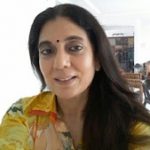
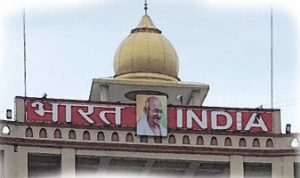
It’s the world’s most dramatic border. A nation cruelly divided as the British quit the subcontinent in 1947.
Portraits of the founding fathers of the two nations, India and Pakistan, Mahatma Gandhi and Muhammad Ali Jinnah witness the crossover as visitors walk the few steps between Attari on the Indian side and Wagah on the Pakistani.
Overwhelmed by the agonising scars of history and a myriad emotions of pain, loss and oneness, it’s a coming home moment for many. Their ancestors had crossed the border during Partition, the most traumatic event in the history of the subcontinent.
-

Portrait of Mohammed Ali Jinnah - A coordinated retreat ceremony parade by soldiers of both nations takes place at the border each day at 5 pm. The weekends see over 25,000 turning up to watch this grand spectacle from their respective stands.
-
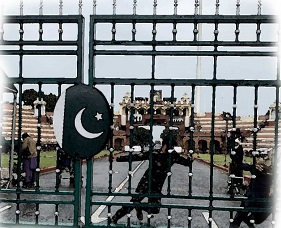
A coordinated retreat ceremony - Today, the two countries, ruthlessly divided by the Radcliffe Line that pierced their very heart, grapple with the political challenges of the present. Yet, when friendships develop there are no borders.
There is a seamless overflow of huge affection and trust-an all encompassing brotherhood that respects the other’s faith.
We (my husband, daughter and I) crossed the border to attend the wedding of our friend’s daughter in Faisalabad, two-and-a-half hours from Lahore.
The bride and our daughter had studied together in England. It’s not unusual to hear Pakistanis and Indians talk about their friendships that blossomed while they were studying either in the US or the UK. These friendships are nurtured and cherished even when they return to their respective countries.
-
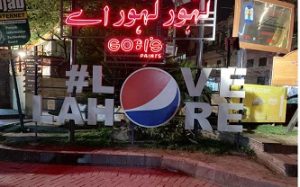
Lahore, capital of the province of Punjab - Stitched together with a common heritage, ugly political divisions are non-existent and religion is a purely personal matter in the academic institutions where these friendships are forged. A young lady who had done her graduation and post-graduation in the UK confided, “There are some friendships across the border that are even more precious to me than my childhood ones in Pakistan. We are the same people.”
For me too it was like a coming home moment.
-

Punja Sahib Gurdwara with in Hasan Abdal, Guru Nanak’s hand print on a boulder
My mother was born in Sargodha, about three hours away from Lahore. The family moved to India during Partition. While she taught us our Sikh prayers and quoted Portia’s ‘quality of mercy’ speech from The Merchant of Venice with ease, interestingly Urdu quotations sprinkled her conversation. Her favourite lines resonate in my ears, Allah khidmat karney ka mauka naseeb walon ko deta hai (God gives the blessed an opportunity to serve). A sentiment that echoes in Sikh scriptures too.
Across the border, each time I mentioned my mother was born in Sargodha, I heard, “Oh my ammi was born in Amritsar”, “My abbu was born in Delhi,” “My khala (aunt) was born in Jalandhar,” “My grandmother was born in Ambala,” The line the British drew sliced the very soul of a region.
“We still hang on to a fragile link,” says a Pakistani lady. “We love the people and the culture. We don’t want to be separated. We are Rajputs. We migrated from India. We consult our relatives there for all marriage customs.”
Needless to add, Bollywood and Hindi film songs are a phenomenal craze in Pakistan, while Pakistani serials continue to be very popular in India. Women’s clothing too finds huge appreciation on both sides of the border and there are always excess baggage issues as visitors carry back tangible reminders of their glorious stay!
Some haven’t yet had a chance to visit. Saba Faisal, national director, SOS Children’s Village, says, “While I have never been to India, over the years I have met some amazing people. Gracious and kind, they make great friends.”
Through our journey the oft-repeated common refrain, “Our roots are the same,” “We are one people”, “Our culture is the same” played out everywhere. And sadly there is the unanimous belief that politics and governments on both sides have over the years deepened the chasm and forcibly kept apart siblings with a common ancestry by making travel across the border a huge challenge.
As Mira Hashmi, a writer, a teacher of film and media studies and grand-daughter of the legendary poet Faiz Ahmad Faiz, says, “After my last visit to India in 2015, visas to Pakistani citizens stopped being granted. “Pakistan on the other hand is issuing visas for conferences and festivals among other categories. “The paperwork is extensive and, of course, it helps to have contacts in high places. “The recently concluded Faiz International Festival is one such example, where there was a contingent of guest participants from India.”
Since Partition, each time there is tension across the LoC, an incident of terror or a contentious political move, both countries seal borders, shut down trade and bring dialogue to a halt.
-

The Royal Bath built by Wazir Khan
In the summer of 2019, Hashmi was invited by her publishers to attend the launch of her book on Gulzar’s film Ijaazat1. “They were blissfully unaware that it was impossible for me to be there, and were genuinely taken aback when I informed them that as a Pakistani I no longer qualified for an Indian visa. “I sent a video message in which I lamented the fact that a mere seven decades of separation had trumped millennia of togetherness, to the point that this ‘bad blood’ continues to be exploited by those for whom power is of far more value than peace.”
It is not just the elite, rarefied circles that believe we are one but even the common man. We had an interesting experience at the Shahi Hammam, built by Wazir Khan, governor of Lahore. The board near the ticket counter of the 17th century royal bath said the fee to enter was 50 Pakistani rupees for locals and 400 Pakistani rupees for foreigners. Since we were three of us we handed over 1,200 Pakistani rupees to the gentleman at the ticket counter. He looked at us quizzically and asked where we were from. “India,” we replied. He looked at his senior, “India se aaye hain (They are from India).” Prompt came the reply “Local rate.” The gentleman at the counter returned 1,050 Pakistani rupees to us.
-
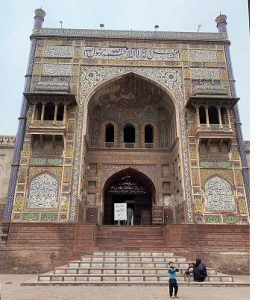
The Wazir Khan Mosque - The senior smiled and added, “We are one people. How is your trip going? I hope you are enjoying yourself here in Pakistan?” Truly touched and overwhelmed by the gesture, we nodded our heads and told him we were delighted to be here.
When we shared this anecdote with a Pakistani friend in Islamabad, he said he had had the same experience at the Taj Mahal in Agra!
Outwardly it’s sometimes hard to differentiate and one could just merge in. Physically and emotionally it is not easy to put the ‘foreigner tag’ on people from the subcontinent. Interestingly, I found that for north Indian women it was the bindi2 on the forehead which was the giveaway.
-

Lahore Fort within the walled city
And it was the bindi that was often a conversation starter, “Aaah, you are from India?” Sometimes there would be an expression of a deep desire to visit India and on one occasion a salesman at a textile store greeted me warmly, reconfirmed my Indian identity and then in a soft voice added, “India ko boliyey na thoda compromise karey (Tell India to compromise a bit).”
Just then, a group of customers walked in and the unfinished conversation hung in the air. His angst was evident, but its cause was unclear.
Was it the hijab controversy3 that was raging in India I wondered? But any kind of real or perceived persecution of the minority community in both countries tends to get magnified across the border.
-
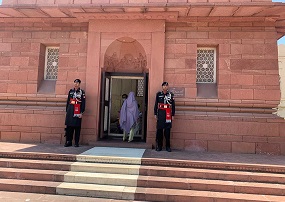
The Mausoleum of Allama Muhammad Iqbal - As Shandana Gulzar, a trade lawyer by profession who joined the Pakistan Tehreek-e-Insaf 4 in 2018 and is a member of the national assembly, the Pakistan parliament, says, “There are two Indias that a regular Pakistani can see, there is Nehru’s India and Modi’s India. “Today what we see happening in India against minorities is cause for concern. While each one of us wants peace, it is hard to see the subjugation of one particular religious order.” Gulzar believes the easiest way to ruin relations is to close borders, “You impose a physical bar that destroys trade, check income flows and force nations into poverty. “To open up borders, trade has to be the number one priority. “What is this senseless violence going to come to with neighbours that are intertwined?”
For an Indian tourist seeking a glimpse into an undivided past, the Punjab province of Pakistan is a veritable treasure trove. It’s a journey deep within. The Mall Road of Lahore is reminiscent of Delhi, as we drive past the Sir Ganga Ram Hospital the tour guide points out he is the architect of modern Lahore.
-

The 142 year hotel where Nehru stayed -
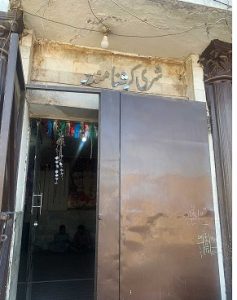
Sri Krishna Temple
Reminders of a bygone age are everywhere: The 142-year-old Faletti’s Hotel where Nehru once stayed, the grandeur of the Lahore Fort, the awe-inspiring Badshahi mosque which has a capacity for 100,000 worshippers, the tomb of Iqbal who wrote Saare Jahan se achcha Hindustan hamara (Our land, Hindustan is the best in the entire world).
We visited the Sri Krishna temple, the only surviving temple in Lahore, Gurdwara Dehra Sahib where Maharaja Ranjit Singh’s5 ashes are interred. The province’s superlative roads make movement easy.
A little over an hour away from Lahore is Nankana Sahib, the birthplace of Guru Nanak, the founder of the Sikh faith.
-

Nankana Sahib, the birthplace of Guru Nanak - Close to Islamabad is the Dharmarajika stupa, a Buddhist monument at Taxila built by Ashoka and the Punja Sahib gurdwara in Hasan Abdal which has Guru Nanak’s handprint on a boulder.
We drove through sugarcane fields in the Punjab province’s Faisalabad district to reach Bangay village, the birthplace of Shaheed Bhagat Singh who fought for freedom from British rule. The list is endless.
-

The birthplace of Shahid Bhagat Singh who fought for freedom from British rule - We cross the border back to India, heady with memories of warmth, lavish hospitality, a stunning wedding, Rahat Fateh Ali Khan’s mesmerising music and an adrenaline-charged walk down the lanes of shared history.
-

Dharmarajika Stupa built by Emperor Ashoka
Shandana Gulzar’s words echo in my ears, “The world is on a mad downward spiral everywhere. The old and the rigid have failed. It’s time for young blood to step in and decide what kind of world they want to see in the next 50 years.”
Hopefully, India and Pakistan too will soften their stance and issue visas with ease to visitors and tourists to walk across the border -an answer to a prayer for those with a palpable yearning for oneness and a deep desire to celebrate their common ancestry.
The article was first published on Rediff.com on March 29, 2022
All pictures are taken by the author
Payal Singh Mohanka is a journalist and writer based in Kolkata.
Footnotes
- A popular film director in Mumbai
- coloured dot
- In the southern province of Karnataka, students have been proscribed from wearing hijab in educational institutions
- Founded by Imran Khan, till recently the Prime Minister of the country
- The indomitable ruler who built the Sikh Empire and died in Lahore in 1839 at the age of 59
